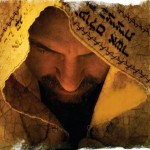by Fr. Patrick Henry Reardon
 How should we understand the necessity (the dei—Mark 8:31) of Christ’s suffering and death? We should begin, I believe, simply by inquiring how we actually know of this necessity. We commence with the fact that this “must” is known to us only through Jesus. Theology has no access to it except through the mind of Christ himself. It was the Savior who discerned the “must” at the heart and center of his vocation in this world.
How should we understand the necessity (the dei—Mark 8:31) of Christ’s suffering and death? We should begin, I believe, simply by inquiring how we actually know of this necessity. We commence with the fact that this “must” is known to us only through Jesus. Theology has no access to it except through the mind of Christ himself. It was the Savior who discerned the “must” at the heart and center of his vocation in this world.
We must start with the mind of Christ.
Let us, then, start. According to the explicit words of our Lord, his sense of the necessity of his Passion and death (and, of course, Resurrection) had to do with his understanding of the Scriptures. He discovered this necessity in the Bible.
Thus, he declared to two of the disciples,
“‘O foolish, and slow of heart to believe in all things the prophets have spoken. Did not the Messiah have to (edei) suffer these things and thus to enter into his glory?’ And beginning at Moses and all the prophets, he expounded to them in all the scriptures, the things concerning himself” (Luke 24:25-27).
From this and other passages in the Gospel stories it is clear that Jesus ascertained this necessity as pertinent to his vocation, as he learned this vocation in the Holy Scriptures. His reading and personal understanding of the Hebrew Bible was how, in prayer to his Father, Jesus made sense of his life and vocation.
Indeed, I believe this expression, “made sense,” captures what I have in mind to say: Jesus, who
“learned obedience by the things that he suffered” (Hebrews 5:8),
established the sense, the existential meaning, of his life and vocation from his understanding of the Scriptures as God’s revelation to him. He made—he created—this sense by obeying the Father in accordance with His Word. The sense he made of his life and vocation was the true sense of Holy Scripture. The “Christological sense” of the Bible comes entirely from Christ’s understanding of it.
Perhaps this imperative perceived by Jesus in prayer to his Father—this revelation, through Holy Scripture, of the Father’s will for him—has an analogue in what we usually mean by personal destiny.
At least, it appears to me that the human sense (the German Ahnung) of destiny provides the best analogy for the “must” (dei) of which Jesus spoke in reference to his Passion and death. To say this in more detail: The “must” experienced and perceived by Jesus had to do with a morally compelling discernment of God’s diachronic, covenantal plan as it was revealed in the concrete, particular, and defining circumstances of his place and role in the history of Israel. This compelling sense of his historical destiny came from Jesus’ personal understanding of biblical prophecy.
In respect to this question, it behooves us to reflect that biblical prophecy is an essential part of biblical history, which is the history of salvation. It is ancient Israel’s own history. The transmission of biblical prophecy to Jesus came to him as the interpretive component of the Hebrew history he inherited; he discerned his place in biblical history through the personal sense he made of the Bible.
Perhaps we may think of this experience of Jesus as a special and (necessarily!) unique expression of what Johan Huizinga called “historical sensation” or “historical contact,” in which a person participates in reality through a particular sense apprehended through memory. This “sense” (Ahnung), associated with distinct places, events, inheritance and connections, conveys an extraordinary perception of truth not otherwise available to human experience.
Thus, when Jesus prayed—at his Baptism, during the Transfiguration, in the garden on the night he was delivered up, and, in short, whenever he turned his face to the Father—he took possession of the salvific history bequeathed to him in the very language by which he spoke and thought. He thereby knew himself to be the Beloved Son, sent to the Vineyard as the fulfillment of all those diverse manners by which, at sundry times, God spoke to the fathers by the prophets.
In this self-awareness before his Father, Jesus perceived the “must” that marked his destiny.
